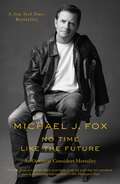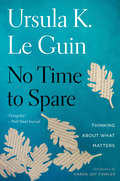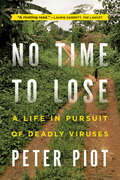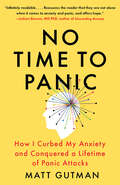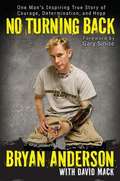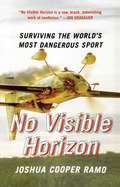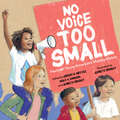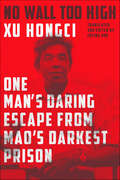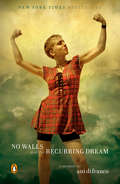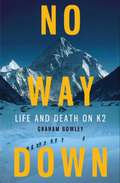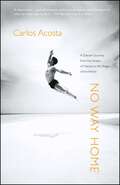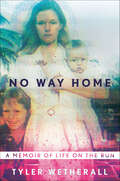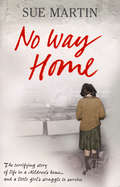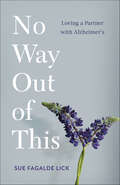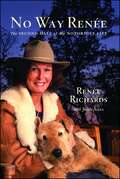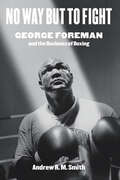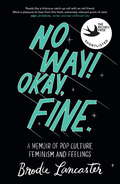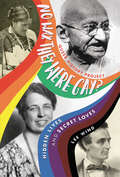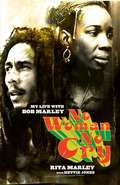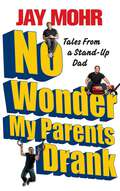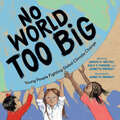- Table View
- List View
No Time Like the Future: An Optimist Considers Mortality
by Michael J. FoxINSTANT NEW YORK TIMES BESTSELLER A moving account of resilience, hope, fear and mortality, and how these things resonate in our lives, by actor and advocate Michael J. Fox. The entire world knows Michael J. Fox as Marty McFly, the teenage sidekick of Doc Brown in Back to the Future; as Alex P. Keaton in Family Ties; as Mike Flaherty in Spin City; and through numerous other movie roles and guest appearances on shows such as The Good Wife and Curb Your Enthusiasm. Diagnosed at age 29, Michael is equally engaged in Parkinson’s advocacy work, raising global awareness of the disease and helping find a cure through The Michael J. Fox Foundation for Parkinson’s Research, the world’s leading non-profit funder of PD science. His two previous bestselling memoirs, Lucky Man and Always Looking Up, dealt with how he came to terms with the illness, all the while exhibiting his iconic optimism. His new memoir reassesses this outlook, as events in the past decade presented additional challenges.In No Time Like the Future: An Optimist Considers Mortality, Michael shares personal stories and observations about illness and health, aging, the strength of family and friends, and how our perceptions about time affect the way we approach mortality. Thoughtful and moving, but with Fox’s trademark sense of humor, his book provides a vehicle for reflection about our lives, our loves, and our losses. Running through the narrative is the drama of the medical madness Fox recently experienced, that included his daily negotiations with the Parkinson’s disease he’s had since 1991, and a spinal cord issue that necessitated immediate surgery. His challenge to learn how to walk again, only to suffer a devastating fall, nearly caused him to ditch his trademark optimism and “get out of the lemonade business altogether.”Does he make it all of the way back? Read the book.
No Time To Spare: Thinking About What Matters
by Ursula K. Le GuinFrom acclaimed author Ursula K. Le Guin, a collection of thoughts—always adroit, often acerbic—on aging, belief, the state of literature, and the state of the nation.Ursula K. Le Guin on the absurdity of denying your age: “If I’m ninety and believe I’m forty-five, I’m headed for a very bad time trying to get out of the bathtub.”On cultural perceptions of fantasy: “The direction of escape is toward freedom. So what is ‘escapism’ an accusation of?”On breakfast: “Eating an egg from the shell takes not only practice, but resolution, even courage, possibly willingness to commit crime.”Ursula K. Le Guin took readers to imaginary worlds for decades. In the last great frontier of life, old age, she explored a new literary territory: the blog, a forum where she shined. The collected best of Ursula’s blog, No Time to Spare presents perfectly crystallized dispatches on what mattered to her late in life, her concerns with the world, and her wonder at it: “How rich we are in knowledge, and in all that lies around us yet to learn. Billionaires, all of us.”“The pages sparkle with lines that make a reader glance up, searching for an available ear with which to share them.” — Melissa Febos, New York Times Book Review“Witty . . . deeply observed.” — USA Today “A book that truly does matter.” — Houston Chronicle
No Time to Lose: A Life in Pursuit of Deadly Viruses
by Peter PiotAs a young scientist, Peter Piot named a newly discovered virus "ebola." This is the story of his extraordinary career. When Peter Piot was in medical school, a professor warned, "There's no future in infectious diseases. They've all been solved." Fortunately, Piot ignored him, and the result has been an exceptional, adventure-filled career. In the 1970s, as a young man, Piot was sent to Central Africa as part of a team tasked with identifying a grisly new virus. Crossing into the quarantine zone on the most dangerous missions, he studied local customs to determine how this disease--the Ebola virus--was spreading. Later, Piot found himself in the field again when another mysterious epidemic broke out: AIDS. He traveled throughout Africa, leading the first international AIDS initiatives there. Then, as founder and director of UNAIDS, he negotiated policies with leaders from Fidel Castro to Thabo Mbeki and helped turn the tide of the epidemic. Candid and engrossing, No Time to Lose captures the urgency and excitement of being on the front lines in the fight against today's deadliest diseases.
No Time to Lose: How I Lost 185 Pounds and Saved My Life
by Debbie LazinskyA certified personal trainer whose amazing weight loss was featured in People magazine shares her secrets! Debbie Lazinsky once weighed over three hundred pounds. Then she transformed her body and her health so successfully that she was profiled in People. Now, Debbie is a certified health coach and trainer who dedicates herself to helping others overcome their own obstacles—safely and sensibly. No one wants to be on a diet—and it&’s just as well, because diets don&’t work. Learning the essentials is the key to successful, natural weight loss, and Debbie teaches anyone struggling how to achieve and maintain a healthy weight without ever dieting again. How did she lose 185 pounds and keep it off? In this book, she tells her story—and explains how foods that are currently being eaten are contributing to excess weight and how to settle into a pattern of steady weight loss. If you&’re sick and tired of all the false promises and gimmicks, No Time to Lose can help with a proven system that&’s simple and efficient and can be tailored for each individual. Discover the truth about what&’s been getting in many people&’s way of having a body they enjoy and being at a weight that works for them!
No Time to Panic: How I Curbed My Anxiety and Conquered a Lifetime of Panic Attacks
by Matt GutmanBy ABC News&’s chief national correspondent, an unflinching look at panic attacks by a reporter whose career was nearly derailed by them, offering readers a guide to making a truce with their warring minds"Brave, reassuring, and practical...A balm for anyone who has ever suffered panic attacks and who longs to be released from their grip." —Dr. Nicole LePera, #1 New York Times bestselling author of How to Do the Work&“Seamlessly weaves page-turning personal experiences with scientific discoveries…A tour de force." —Ethan Kross, bestselling author of ChatterMatt Gutman can tell you the precise moment when his life was upended. Reporting live on a huge story in January 2020, he found himself in the throes of an on-air panic attack—and not for the first time. The truth is that Gutman had been enduring panic attacks in secret for twenty years: soul-bruising episodes that left his vision constricted, his body damp, his nerves shot. Despite the challenges, he had carved out a formidable career, reporting from war zones and natural disasters before millions of viewers on Good Morning America, World News Tonight, and 20/20. His nerves typically &“punched through&” to TV audiences, making his appearances kinetic and often unforgettable.But his January 2020 broadcast was unusual for all the wrong reasons. Mid-panic, Gutman misstated the facts of a story, a blunder that led to a monthlong suspension, not to mention public shame and personal regret.It was a reckoning. Gutman&’s panic attacks had become too much for him to bear in secret. He needed help.So begins a personal journey into the science and treatment of panic attacks. Gutman would talk to the world&’s foremost scholars on panic and anxiety, who showed him that his mind wasn&’t broken; it&’s our perception of panic that needs recalibration. He would consult therapists and shamans, trying everything from group treatment and cognitive behavioral therapy to ayahuasca and psilocybin. And he would take a hard look at the trauma reverberating inside him—from his childhood, but also from his years as a conflict reporter.Unsparing, perceptive, and often funny, this is the story of a panic sufferer who took on the monster within. Filled with wisdom and actionable insights, it&’s at once an inspirational journey and a road map—if not toward a singular cure, then to something even more worthy: peace of mind.
No Turning Back
by David Mack Bryan AndersonThe word conquer has changed meaning for Bryan Anderson. As a U.S. Army Sergeant in Iraq, it meant taking down the enemy. After becoming Iraq's fourth triple amputee from a roadside explosive, what he had to conquer got a bit more personal. On October 23, 2005, the moment Bryan looked down and realized he no longer had legs, he cracked a joke. It was a tragedy that could break many, but Bryan transformed it into something positive, something that propelled him forward. Despite grueling surgeries and rehabilitation, his goal has always been bigger than simply walking again. Making the most of life, he went for it, learning how to snowboard, water-ski, rock climb, and skateboard with his condition--even winning himself some gold medals to place next to his Purple Heart. In this inspiring memoir, Bryan shares his infectious love for life that touches anyone who's faced hardship. Anyone, in any circumstance, can overcome the toughest challenges, by not just surviving, but thriving. No Turning Back is a testament to pure hard work, perseverance, and hope for a better life--no matter what shape it takes.
No Turning Back, Regardless: How God Rescued Me, Redeemed Me, and Restored My Heart with a Song
by Lisa DaggsIn the midst of heartbreak and struggle, how can you remain committed to God regardless of your circumstances? In No Turning Back, Regardless, award-winning Christian country singer Lisa Daggs shares her story of addiction, conviction, and triumph about learning to trust the God Who loved her regardless of her circumstances. In 1989, Daggs sat, hopeless, in a jail cell as the women around her picked scabs and spat on the floor. She was facing three to five years of incarceration after a felony charge for cocaine possession with intent to sell. Rather than surrendering to her circumstances, Daggs made a decision: She would follow God regardless.
No Visible Horizon: Surviving the World's Most Dangerous Sport
by Joshua Cooper RamoThe flying life has always demanded a passage across the razor's edge. At any moment you could slip to the other side: a gas leak, weather, fire in the cockpit. Sometimes what made the risks particularly horrible was that you could watch your mistakes play out in front of you, as a chorus of guilt followed you down. Usually you survived and could describe this music to others, but none of you -- not even with a long and growing trail of dead friends -- ever stopped flying. That was the truly unthinkable thing. In a good year aerobatics is one of the most beautiful sports imaginable. Pilots pull through impossibly elegant figures, twisting their planes at hundreds of miles an hour. The stress on their bodies reaches ten times the force of gravity, but this is nothing compared to the strain on their minds and the tension in their souls. In a bad year no sport kills more of its participants. To fly really well and to win you must depart the land of the possible and enter a place of pure faith. In this stunning literary debut, Joshua Cooper Ramo has crafted a meditation on the seduction of flight and a passionate love letter to a life of risk. It is partly the story of his own decision, after a decade of casual aerobatics, to transform himself into a serious competitive pilot aiming to finish high at the U. S. national competition. He introduces us to some of the greatest aerobatic pilots in the world: geniuses like Leo Loudenslager, a mild-mannered American Airlines pilot who spent his weekends redefining what it was possible to do in the air with a plane, flying figures so hard they made his eyes bleed as he whimpered with pain in the cockpit; or Kirby Chambliss, the Arizona pilot who performed figures just inches off the runway and sent his plane shooting through holes in cliffs. The classics of flight and extreme adventure, West With the Night; Wind, Sand, and Stars; and Into Thin Air have brought a poetic vision to their subjects. No Visible Horizon is an elegant and thrilling exploration, not simply of a pilot's physical battle against gravity, but of his dream of perfection and his quest for faith.
No Voice Too Small: Fourteen Young Americans Making History
by Jeanette BradleyFans of We Rise, We Resist, We Raise Our Voices will love meeting fourteen young activists who have stepped up to make change in their community and the United States.Mari Copeny demanded clean water in Flint. Jazz Jennings insisted, as a transgirl, on playing soccer with the girls' team. From Viridiana Sanchez Santos's quinceañera demonstration against anti-immigrant policy to Zach Wahls's moving declaration that his two moms and he were a family like any other, No Voice Too Small celebrates the young people who know how to be the change they seek. Fourteen poems honor these young activists. Featuring poems by Lesléa Newman, Traci Sorell, and Nikki Grimes. Additional text goes into detail about each youth activist's life and how readers can get involved.
No Wall Too High: One Man's Daring Escape from Mao's Darkest Prison
by Xu Hongci"A masterpiece." —The Washington Post"It was impossible. All of China was a prison in those days."Mao Zedong’s labor reform camps, known as the laogai, were notoriously brutal. Modeled on the Soviet Gulag, they subjected their inmates to backbreaking labor, malnutrition, and vindictive wardens. They were thought to be impossible to escape—but one man did.Xu Hongci was a bright young student at the Shanghai No. 1 Medical College, spending his days studying to be a professor and going to the movies with his girlfriend. He was also an idealistic and loyal member of the Communist Party and was generally liked and well respected. But when Mao delivered his famous February 1957 speech inviting “a hundred schools of thought [to] contend,” an earnest Xu Hongci responded by posting a criticism of the party—a near-fatal misstep. He soon found himself a victim of the Anti-Rightist Campaign, condemned to spend the next fourteen years in the laogai.Xu Hongci became one of the roughly 550,000 Chinese unjustly imprisoned after the spring of 1957, and despite the horrific conditions and terrible odds, he was determined to escape. He failed three times before finally succeeding, in 1972, in what was an amazing and arduous triumph.Originally published in Hong Kong, Xu Hongci’s remarkable memoir recounts his life from childhood through his final prison break. After discovering his story in a Hong Kong library, the journalist Erling Hoh tracked down the original manuscript and compiled this condensed translation, which includes background on this turbulent period, an epilogue that follows Xu Hongci up to his death, and Xu Hongci’s own drawings and maps. Both a historical narrative and an exhilarating prison-break thriller, No Wall Too High tells the unique story of a man who insisted on freedom—even under the most treacherous circumstances.
No Walls and the Recurring Dream: A Memoir
by Ani DiFrancoA memoir by the celebrated singer-songwriter and social activist Ani DiFranco <P><P>In her new memoir, No Walls and the Recurring Dream, Ani DiFranco recounts her early life from a place of hard-won wisdom, combining personal expression, the power of music, feminism, political activism, storytelling, philanthropy, entrepreneurship, and much more into an inspiring whole. In these frank, honest, passionate, and often funny pages is the tale of one woman's eventful and radical journey to the age of thirty. <P><P>Ani's coming of age story is defined by her ethos of fierce independence--from being an emancipated minor sleeping in a Buffalo bus station, to unwaveringly building a career through appearances at small clubs and festivals, to releasing her first album at the age of 18, to consciously rejecting the mainstream recording industry and creating her own label, Righteous Babe Records. In these pages, as in life, she never hesitates to question established rules and expectations, maintaining a level of artistic integrity that has inspired and challenged more than a few. <P><P>Ani continues to be a major touring and recording artist as well as a celebrated activist and feminist, standing as living proof that you can overcome all personal and societal obstacles to be who you are and to follow your dreams. <P><b>A New York Times Bestseller</b>
No Way Down
by Graham BowleyIn this riveting work of narrative nonfiction, journalist Graham Bowley re-creates one of the most dramatic tales of death and survival in mountaineering history, vividly taking readers through the tragic 2008 K2 ascent that claimed the lives of eleven climbers, severely injured two others, and made headlines around the world. With its near-perfect pyramid shape, the 28,251-foot K2-the world's second-highest mountain, some 800 feet shorter than the legendary Everest hundreds of miles to the south-has lured serious climbers for decades. In 2008, near the end of a brief climbing season cut even shorter by bad weather, no fewer than ten international teams-some experienced, others less prepared-crowded the mountain's dangerous slopes with their Sherpas and porters, waiting to ascend. Finally, on August 1, they were able to set off. But hindered by poor judgment, lack of equipment, and overcrowded conditions, the last group did not summit until nearly 8 p.m., hours later than planned. Then disaster struck when a huge ice chunk from above the Bottleneck, a deadly 300-foot avalanche-prone gulley just below the summit, came loose and destroyed the fixed guide ropes. More than a dozen climbers and porters still above the Bottleneck-many without oxygen and some with no headlamps-faced the near impossibility of descending in the blackness with no guideline and no protection. Over the course of the chaotic night, some would miraculously make it back. Others would not. Based on in-depth interviews with surviving climbers and many Sherpas, porters, and family and friends of the deceased, No Way Down reveals for the first time the full dimensions of this harrowing drama.
No Way Home: A Dancer's Journey from the Streets of Havana to the Stages of the World
by Carlos AcostaCarlos Acosta, the Cuban dancer considered to be one of the world's greatest performers, fearlessly depicts his journey from adolescent troublemaker to international superstar in his captivating memoir, No Way Home.Carlos was just another kid from the slums of Havana; the youngest son of a truck driver and a housewife, he ditched school with his friends and dreamed of becoming Cuba's best soccer player. Exasperated by his son's delinquent behavior, Carlos's father enrolled him in ballet school, subjecting him to grueling days that started at five thirty in the morning and ended long after sunset. The path from student to star was not an easy one. Even as he won dance competitions and wowed critics around the world, Carlos was homesick for Cuba, crippled by loneliness and self-doubt. As he traveled the world, Carlos struggled to overcome popular stereotypes and misconceptions; to maintain a relationship with his family; and, most of all, to find a place he could call home. This impassioned memoir is about more than Carlos's rise to stardom. It is about a young man forced to leave his homeland and loved ones for a life of self-discipline, displacement, and physical hardship. It is also about how the heart and soul of a country can touch the heart and soul of one of its citizens. With candor and humor, Carlos vividly depicts daily life in communist Cuba, his feelings about ballet -- an art form he both lovesand hates -- and his complex relationship with his father. Carlos Acosta makes dance look effortless, but the grace, strength, and charisma we see onstage have come at a cost. Here, in his own words, is the story of the price he paid.
No Way Home: A Memoir of Life on the Run
by Tyler WetherallOne of PureWow's "20 Books We Can’t Wait to Read in 2018" and "Books to Read in April"• One of InStyle UK's "Best New Books to Read in 2018"• One of LitHub's 20 Books You Should Read This April•One of Bustle's "5 Gripping Memoirs Under 300 Pages To Read In One Weekend"A memoir of growing up on the run—and what happens when it comes to a stop."Lucid, tender, exquisitely re-imagined, and compulsively readable." —Jessica Nelson, author of If Only You People Could Follow Directions"In this wondrous and richly detailed coming of age story, Tyler Wetherall follows the breadcrumbs of her childhood to discover a family home that is unlike any other." —Katy Lederer, author of Poker FaceTyler had lived in thirteen houses and five countries by the time she was nine. A willful and curious child, she never questioned her strange upbringing, that is, until Scotland Yard showed up outside her ramshackle English home, and she discovered her family had been living a lie: Her father was a fugitive and her name was not her own. In sunny California, ten years earlier, her father’s criminal organization first came to the FBI’s attention. Soon after her parents were forced on the run taking their three young children with them, and they spent the following years fleeing through Europe, assuming different identities and hiding out in a series of far-flung places. Now her father was attempting one final escape—except this time, he couldn’t take her with him.In this emotionally compelling and gripping memoir, Tyler Wetherall brings to life her fugitive childhood, following the threads that tie a family together through hardship, from her parents’ first meeting in 1960s New York to her present life as a restless writer unpacking the secrets of her past. No Way Home is about love, loss, and learning to tell the story of our lives.
No Way Home: The terrifying story of life in a children's home and a little girl's struggle to survive
by Sue MartinSue Martin was not three years old when she began life at her first children's home: a home that could at best be described as cold and regimented; at worst, torturous and terrifying. When her mother abandoned her to the protection of the home, Sue was soon to discover that behind the welcoming doors of this reputedly kind-hearted organisation lay a world steeped in lies, cover-ups, victimisation and abuse. At its heart was Boagey, whose perverse bullying was targeted at Sue. Her attacks quickly progressed from the gratuitous punishment of an innocent child to sordid gratification of her sexual whims.Sue's story is one of institutional abuse - of physical, mental and emotional torture of the most appalling kind - but it also a story full of joy, humour and many victories - small and large - against her abusers.Utterly compelling and shockingly revelatory, No Way Home will astound, move and inspire.
No Way Out of This: Loving a Partner with Alzheimer's
by Sue Fagalde LickNo Way Out of This is not the kind of Alzheimer’s memoir where you read about a noble, self-sacrificing wife who gives up everything to take care of her husband. We see such spouses in books and movies—but they’re not telling the whole story. Nobody’s that good. Certainly Sue Lick isn’t. Sue’s much-older husband, Fred, is a forgetful man. She’s always found that charming. But when his absentmindedness worsens into full-blown dementia, she suddenly finds herself dealing with his illness alone. Struggling to care for Fred and manage their two loveable but incorrigible dogs and still find time to write and play music, Sue constantly faces impossible choices. Tell people about his illness? Let him drive? Put him in an institution? Treat his medical problems, or let him go? Every decision feels wrong—but in the end, their love carries them through it all.More than 6 million Americans suffer from dementia. One in three seniors have it. Add in the spouses, siblings, adult children, and professionals responsible for their care, and we all have a stake in this story. While some caregivers have loving families to support them and enough money to pay for the best care, more often the situation is a lot messier. Here the author, a longtime journalist, tells the truth about nursing homes, Medicaid, mental health, and more.
No Way Renee: The Second Half of My Notorious Life
by John Ames Renee RichardsIn 1975, at the age of forty, Richard Raskind, a renowned eye surgeon and highly ranked amateur tennis player, "died," and Renée Richards was "born," in what was to become the most public and highly scrutinized sex reassignment to date. It was not until Renée Richards was discovered playing in an amateur tennis tournament that the world took notice. Extensive media coverage and criticism thrust Renée reluctantly into the spotlight, sparking an intense public debate over her private life. Now, at seventy-two, Richards looks back and speaks frankly about all aspects of her complicated and often notorious life in this eye-opening, thought-provoking memoir. Richards' honest and compelling narrative explores the dichotomy between the successful life she lived as Dr. Richard Raskind, who seemed to have everything (devoted friends, a beautiful wife and son, a stellar record of academic and professional achievement, and outstanding athletic ability), and a secret life of struggle with a drive that could not be suppressed, even by years of psychotherapy and the force of a considerable will. Richards takes readers through her difficult decision to undergo surgery and the complex mixture of relief and continued frustration that came with the realization of her new identity. Discussing life after her transformation, Richards candidly relates the details, trials, and pleasures of her romantic life as well as fascinating stories about her tennis career, including her experiences as Martina Navratilova's coach. She also provides an intimate account of her difficult but rewarding relationship with her rebellious son: runaway teenager, high-stakes Vegas gambler, karate champion, and entrepreneur. She describes the deterioration of a once-loving marriage and the challenges of reclaiming her place at the forefront of her demanding medical specialty. Having lived as a woman almost as long as she lived as a man, Richards draws on a personal history that illuminates thirty years of remarkable change in society's attitude toward gender issues. Her absorbing and inspiring story, at once heartbreaking and uplifting, is a testimony to how far we have progressed in our ability to discuss and accept sexuality in all its iterations, as well as a reminder of how far we still must travel.
No Way but to Fight: George Foreman and the Business of Boxing (Terry and Jan Todd Series on Physical Culture and Sports)
by Andrew R. Smith&“[A] fascinating, colorful new biography . . . [Smith] writes of a boxer who ultimately triumphed in the most unvirtuous of sports.&” —Texas Observer Olympic gold medalist. Two-time world heavyweight champion. Hall of Famer. Infomercial and reality TV star. George Foreman&’s fighting ability is matched only by his acumen for selling. Yet the complete story of Foreman&’s rise from urban poverty to global celebrity has never been told until now. Raised in Houston&’s &“Bloody Fifth&” Ward, battling against scarcity in housing and food, young Foreman fought sometimes for survival and other times just for fun. But when a government program rescued him from poverty and introduced him to the sport of boxing, his life changed forever. In No Way but to Fight, Andrew R. M. Smith traces Foreman&’s life and career from the Great Migration to the Great Society, through the Cold War and culture wars, out of urban Houston and onto the world stage where he discovered that fame brought new challenges. Drawing on new interviews with George Foreman and declassified government documents, as well as more than fifty domestic and international newspapers and magazines, Smith brings to life the exhilarating story of a true American icon. No Way but to Fight is an epic worthy of a champion. &“An insightful life study . . . Smith&’s captivating narrative suggests that Mr. Foreman is much more than the outsize roles he has played.&” —The Wall Street Journal &“While Foreman&’s life has been dissected before, Smith&’s account, which includes fresh interviews with the man himself as well as extracts from recently declassified government documents, rates as perhaps the best.&” —Bristol Post
No Way but to Fight: George Foreman and the Business of Boxing (Terry and Jan Todd Series on Physical Culture and Sports)
by Andrew R. Smith&“[A] fascinating, colorful new biography . . . [Smith] writes of a boxer who ultimately triumphed in the most unvirtuous of sports.&” —Texas Observer Olympic gold medalist. Two-time world heavyweight champion. Hall of Famer. Infomercial and reality TV star. George Foreman&’s fighting ability is matched only by his acumen for selling. Yet the complete story of Foreman&’s rise from urban poverty to global celebrity has never been told until now. Raised in Houston&’s &“Bloody Fifth&” Ward, battling against scarcity in housing and food, young Foreman fought sometimes for survival and other times just for fun. But when a government program rescued him from poverty and introduced him to the sport of boxing, his life changed forever. In No Way but to Fight, Andrew R. M. Smith traces Foreman&’s life and career from the Great Migration to the Great Society, through the Cold War and culture wars, out of urban Houston and onto the world stage where he discovered that fame brought new challenges. Drawing on new interviews with George Foreman and declassified government documents, as well as more than fifty domestic and international newspapers and magazines, Smith brings to life the exhilarating story of a true American icon. No Way but to Fight is an epic worthy of a champion. &“An insightful life study . . . Smith&’s captivating narrative suggests that Mr. Foreman is much more than the outsize roles he has played.&” —The Wall Street Journal &“While Foreman&’s life has been dissected before, Smith&’s account, which includes fresh interviews with the man himself as well as extracts from recently declassified government documents, rates as perhaps the best.&” —Bristol Post
No Way! Okay, Fine: A memoir of pop culture, feminism and feelings
by Brodie Lancaster"Brodie is whip smart; merging pop-culture references with vulnerable, personal experiences to create a collection that reads like a hilarious catch-up call with an old friend. What a pleasure to hear from this fresh, extremely relevant point of view." Abbi Jacobson, CO-CREATOR / WRITER / STAR of BROAD CITY"I wish Brodie was the voice of my inner monologue; narrating me through life with her fierce intelligence and never-ending pop culture references. Instead, I'll just settle for this extremely relatable, unashamedly funny, powerful and beautifully vulnerable book No Way! Okay, Fine." - Courtney Barnett, ARIA award winning and Grammy nominated songwriter and musician.'I identified early on that my role in relationships was the sidekick, the platonic female cast member in an all-male production, or the friend who was relied on selectively when other options were unavailable. I was the comic relief or the stand-in, never the lead. I knew this, I felt it, I wrote it down, but I didn't dare say it aloud because that would prove that I cared and caring wasn't cool.'From the small town in regional Australia where she was told that 'girls can't play the drums' to New York City and back again, Brodie has spent her life searching screens, books, music and magazines for bodies like hers, girls who loved each other, and women who didn't follow the silent instructions to shrink or hide that they've received since literal birth. This is the story of life as a young woman through the lenses of feminism and pop culture.Brodie's story will make you re-evaluate the power of pop culture in our lives - and maybe you will laugh and cry along the way.'Brodie Lancaster is a thoughtful and patient writer, and this book is a generous, deep dive into her psyche. Brodie's thoughts about her body, her friends and lovers, her choices and fears are all presented with the same staccato blast of pop culture touchstones, and if you love boy bands/the internet/reality television/the Gilmore Girls/literally every other thing that is good in the world, you will adore this book.' - Emma Straub, bestselling author of THE VACATIONERS and MODERN LOVERS.
No Way, They Were Gay?: Hidden Lives and Secret Loves (Queer History Project)
by Lee Wind"History" sounds really official. Like it's all fact. Like it's definitely what happened. But that's not necessarily true. History was crafted by the people who recorded it. And sometimes, those historians were biased against, didn't see, or couldn't even imagine anyone different from themselves. That means that history has often left out the stories of LGBTQIA+ people: men who loved men, women who loved women, people who loved without regard to gender, and people who lived outside gender boundaries. Historians have even censored the lives and loves of some of the world's most famous people, from William Shakespeare and Pharaoh Hatshepsut to Cary Grant and Eleanor Roosevelt. Join author Lee Wind for this fascinating journey through primary sources—poetry, memoir, news clippings, and images of ancient artwork—to explore the hidden (and often surprising) Queer lives and loves of two dozen historical figures.
No Woman No Cry: My Life with Bob Marley
by Rita MarleyA memoir by the woman who knew Bob Marley best--his wife, Rita.Rita Marley grew up in the slums of Trench Town, Jamaica. Abandoned by her mother at a very young age, she was raised by her aunt. Music ran in Rita's family, and even as a child her talent for singing was pronounced. By the age of 18, Rita was an unwed mother, and it was then that she met Bob Marley at a recording studio in Trench Town. Bob and Rita became close friends, fell in love, and soon, she and her girlfriends were singing backup for the Wailers. At the ages of 21 and 19, Bob and Rita were married.The rest is history: Bob Marley and the Wailers set Jamaica and the world on fire. But while Rita displayed blazing courage, joy, and an indisputable devotion to her husband, life with Bob was not easy. There were his liaisons with other women--some of which produced children and were conducted under Rita's roof. The press repeatedly reported that Bob was unmarried to preserve his "image." But Rita kept her self-respect, and when Bob succumbed to cancer in 1981, she was at his side. In the years that followed, she became a force in her own right--as the Bob Marley Foundation's spokesperson and a performer in her reggae group, the I-Three.Written with author Hettie Jones, No Woman No Cry is a no-holds-barred account of life with one of the most famous musicians of all time. In No Woman No Cry, readers will learn about the never-before-told details of Bob Marley's life, including: How Rita practiced subsistence farming when first married to Bob to have food for her family. How Rita rode her bicycle into town with copies of Bob's latest songs to sell. How Rita worked as a housekeeper in Delaware to help support her family when her children were young. Why Rita chose to befriend some of the women with whom Bob had affairs and to give them advice on rearing the children they had with Bob. The story of the attack on Bob which almost killed the two of them. Bob's last wishes, dreams, and hopes, as well as the details of his death, such as who came to the funeral (and who didn't).
No Wonder My Parents Drank: Tales from a Stand-Up Dad
by Jay MohrYOU’LL NEVER SLEEP IN THIS TOWN AGAINFrom Saturday Night Live to stand-up, from a blockbuster film career to the star of CBS’s hit television show Gary Unmarried, Jay Mohr is one of the funniest people in comedy today. Now, in this down and dirty tale of modern fatherhood, Mohr shares his stories as a first-time parent. No Wonder My Parents Drank reveals the details behind Mohr’s humiliating test-tube conception attempts and then recounts the trauma of not only having to keep this child alive, but having to spend time alone with him! He waxes poetic about dirty diapers; spins theories on spanking; and mulls over the more hidden advantages of parenthood, like carpool lane access, carte blanche to use the ladies restroom, and an alibi for missing family dinners. Mohr describes, in painfully funny detail, the bizarre situations that all parents inevitably face but can never prepare for (such as when his kid discovered his dog’s rear end) as well as moments of pure joy like taking his son to his first baseball game. Mohr reports on the hilarious wisdom that his son, Jackson, has taught him—like why it’s fun to play "Kissy Boy" with the other boys at recess, how important sunscreen is for avoiding a "sunborn," and how awesome it is to get a "rainbow belt" in karate.Riotously acerbic and refreshingly honest, No Wonder My Parents Drank casts the very funny Jay Mohr with an even funnier mini-me sidekick as a supporting character in a little comedic love story that every person who either is a parent or has a parent will find delightful.
No World Too Big: Young People Fighting Global Climate Change
by Jeanette Bradley Lindsay H. Metcalf Keila V. DawsonFans of No Voice Too Small will be inspired by young climate activists who made an impact around climate change in their communities, countries, and beyond.Climate change impacts everyone, but the future belongs to young people. No World Too Big celebrates twelve young activists and three activist groups on front lines of the climate crisis who have planted trees in Uganda, protected water in Canada, reduced school-bus climate footprint in Indonesia, invented alternate power sources in Ohio, and more. Fourteen poems by Vanessa Brantley-Newton, David Bowles, Rajani LaRocca, Renée LaTulippe, Heidi E. Y. Stemple, and others honor activists from all over the world and the United States. Additional text goes into detail about each activist's life and how readers can get involved.
